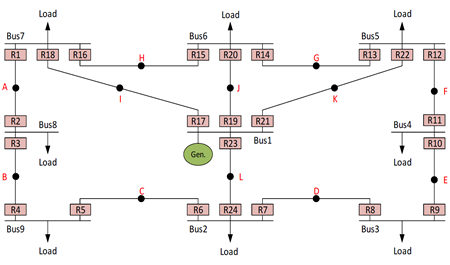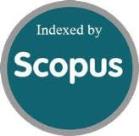Optimal Relay Coordination for DG-Based Power System Using Standard and User-Defined Relay Characteristics
DOI:
https://doi.org/10.46604/ijeti.2022.8826Keywords:
coordination time interval, grey wolf optimization, plug setting, relay coordination, time multiplier settingAbstract
The operating time of directional overcurrent relays (DOCRs) can be reduced with user-defined relay characteristics considering plug setting (PS), time multiplier setting (TMS), and relay characteristic coefficients (λ and γ). This study presents a comparative analysis of relay coordination with standard and user-defined relay characteristics. The proposed relay coordination scheme is formulated as a non-linear constraint optimization problem. The grey wolf optimization (GWO) algorithm is used to determine the optimal relay settings and total operating time of DOCRs. The performance of the proposed scheme is tested on the standard 8-bus, 9-bus, and 15-bus systems. The results show that the total operating time of DOCRs with user-defined relay characteristics is better than that with standard relay characteristics. The results of the GWO algorithm are compared with the performance of optimization techniques used in literature to solve the relay coordination problem.
References
G. Benmouyal, “IEEE Standard Inverse-Time Characteristic Equations for Overcurrent Relays,” IEEE Transactions on Power Delivery, vol. 14, no. 3, pp. 868-872, July 1999.
L. Hong, M. Rizwan, M. Wasif, S. Ahmad, M. Zaindin, and M. Firdausi, “User-Defined Dual Setting Directional Overcurrent Relays with Hybrid Time Current-Voltage Characteristics-Based Protection Coordination for Active Distribution Network,” IEEE Access, vol. 9, pp. 62752-62769, 2021.
S. Jamali and H. Shateri, “A Branch-Based Method to Break-Point Determination for Coordination of Over-Current and Distance Relays,” International Conference on Power System Technology, pp. 1857-1862, November 2004.
R. Tiwari, R. K. Singh, and N. K. Choudhary, “Performance Analysis of Optimization Technique for Protection Coordination in Single and Multi-Loop Distribution System,” International Conference on Electrical, Electronics, and Computer Engineering, pp. 1-6, November 2019.
A. Gupta, O. G. Swathika, and S. Hemamalini, “Optimum Coordination of Overcurrent Relays in Distribution Systems Using Big-M and Dual Simplex Methods,” International Conference on Computational Intelligence and Communication Networks, pp. 1540-1543, December 2015.
S. V. Khond and G. A. Dhomane, “Optimum Coordination of Directional Overcurrent Relays for Combined Overhead/Cable Distribution System with Linear Programming Technique,” Protection and Control of Modern Power Systems, vol. 4, no. 1, pp. 1-7, 2019.
P. P. Bedekar and P. N. Korde, “Determining Optimum Time Multiplier Setting of Overcurrent Relays Using Modified Jaya Algorithm,” Innovations in Power and Advanced Computing Technologies, pp. 1-6, April 2017.
D. Orazgaliyev, A. Tleubayev, B. Zholdaskhan, H. K. Nunna, A. Dadlani, and S. Doolla, “Adaptive Coordination Mechanism of Overcurrent Relays Using Evolutionary Optimization Algorithms for Distribution Systems with DGs,” International Conference on Smart Energy Systems and Technologies, pp. 1-6, September 2019.
A. A. Kalage and A. Bhuskade, “Optimum Coordination of Directional Overcurrent Relays Using Advanced Teaching Learning Based Optimization Algorithm,” IEEE Global Conference on Wireless Computing and Networking, pp. 187-191, November 2018.
J. M. Tripathi, Adhishree, and R. Krishan, “Optimal Coordination of Overcurrent Relays Using Gravitational Search Algorithm with DG Penetration,” 6th IEEE Power India International Conference, pp. 1-6, December 2014.
P. N. Korde and P. P. Bedekar, “Optimal Overcurrent Relay Coordination in Distribution System Using Nonlinear Programming Method,” International Conference on Electrical Power and Energy Systems, pp. 372-376, December 2016.
H. A. Jabir, S. Kamel, A. Selim, and F. Jurado, “Optimal Coordination of Overcurrent Relays Using Metaphor-Less Simple Method,” 21st International Middle East Power System Conference, pp. 1063-1067, December 2019.
D. Irawan, A. Tjahjono, M. Pujiantara, and P. M. Hery, “Adaptive Overcurrent Relays Coordination Based on Multiple Sequence Alignment Algorithm (MSA),” International Seminar on Intelligent Technology and Its Applications, pp. 101-106, July 2016.
A. Korashy, S. Kamel, T. Alquthami, and F. Jurado, “Optimal Coordination of Standard and Non-Standard Direction Overcurrent Relays Using an Improved Moth-Flame Optimization,” IEEE Access, vol. 8, pp. 87378-87392, 2020.
T. S. Aghdam, H. K. Karegar, and H. H. Zeineldin, “Variable Tripping Time Differential Protection for Microgrids Considering DG Stability,” IEEE Transactions on Smart Grid, vol. 10, no. 3, pp. 2407-2415, May 2019.
S. Mirjalili, S. M. Mirjalili, and A. Lewis, “Grey Wolf Optimizer,” Advances in Engineering Software, vol. 69, pp. 46-61, March 2014.
A. Korashy, S. Kamel, A. R. Youssef, and F. Jurado, “Solving Optimal Coordination of Direction Overcurrent Relays Problem Using Grey Wolf Optimization (GWO) Algorithm,” 20th International Middle East Power Systems Conference, pp. 621-625, December 2018.
M. Ezzeddine, R. Kaczmarek, and M. U. Iftikhar, “Coordination of Directional Overcurrent Relays Using a Novel Method to Select Their Settings,” IET Generation, Transmission, and Distribution, vol. 5, no. 7, pp. 743-750, July 2011.
A. Tjahjono, D. O. Anggriawan, A. K. Faizin, A. Priyadi, M. Pujiantara, T. Taufik, et al., “Adaptive Modified Firefly Algorithm for Optimal Coordination of Overcurrent Relays,” IET Generation, Transmission, and Distribution, vol. 11, no. 10, pp. 2575-2585, July 2017.
T. R. Chelliah, R. Thangaraj, S. Allamsetty, and M. Pant, “Coordination of Directional Overcurrent Relays Using Opposition Based Chaotic Differential Evolution Algorithm,” International Journal of Electrical Power and Energy Systems, vol. 55, pp. 341-350, February 2014.
A. Y. Abdelaziz, H. E. A. Talaat, A. I. Nosseir, and A. A. Hajjar, “An Adaptive Protection Scheme for Optimal Coordination of Overcurrent Relays,” Electric Power Systems Research, vol. 61, no. 1, pp. 1-9, 2002.
T. Amraee, “Coordination of Directional Overcurrent Relays Using Seeker Algorithm,” IEEE Transactions on Power Delivery, vol. 27, no. 3, pp. 1415-1422, July 2012.
F. A. Albasri, A. R. Alroomi, and J. H. Talaq, “Optimal Coordination of Directional Overcurrent Relays Using Biogeography-Based Optimization Algorithms,” IEEE Transactions on Power Delivery, vol. 30, no. 4, pp. 1810-1820, August 2015.
P. P. Bedekar and S. R. Bhide, “Optimum Coordination of Directional Overcurrent Relays Using the Hybrid GA-NLP Approach,” IEEE Transactions on Power Delivery, vol. 26, no. 1, pp. 109-119, January 2011.
A. R. Al-Roomi and M. E. El-Hawary, “Optimal Coordination of Directional Overcurrent Relays Using Hybrid BBO-LP Algorithm with the Best Extracted Time-Current Characteristic Curve,” Canadian Conference on Electrical and Computer Engineering, pp. 1-6, April 2017.
J. Radosavljević and M. Jevtić, “Hybrid GSA-SQP Algorithm for Optimal Coordination of Directional Overcurrent Relays,” IET Generation, Transmission, and Distribution, vol. 10, no. 8, pp. 1928-1937, May 2016.
T. Khurshaid, A. Wadood, S. G. Farkoush, C. Kim, J. Yu, and S. Rhee, “Improved Firefly Algorithm for the Optimal Coordination of Directional Overcurrent Relays,” IEEE Access, vol. 7, pp. 78503-78514, 2019.
G. U. Darji, M. J. Patel, V. N. Rajput, and K. S. Pandya, “A Tuned Cuckoo Search Algorithm for Optimal Coordination of Directional Overcurrent Relays,” International Conference on Power and Advanced Control Engineering, pp. 162-167, August 2015.
A. M. Othman and A. Y. Abdelaziz, “Enhanced Backtracking Search Algorithm for Optimal Coordination of Directional Over-Current Relays Including Distributed Generation,” Electric Power Components and Systems, vol. 44, no. 3, pp. 278-290, 2016.
J. Yu, C. H. Kim, and S. B. Rhee, “Oppositional Jaya Algorithm with Distance-Adaptive Coefficient in Solving Directional Overcurrent Relays Coordination Problem,” IEEE Access, vol. 7, pp. 150729-150742, 2019.

Published
How to Cite
Issue
Section
License
Copyright Notice
Submission of a manuscript implies: that the work described has not been published before that it is not under consideration for publication elsewhere; that if and when the manuscript is accepted for publication. Authors can retain copyright in their articles with no restrictions. Also, author can post the final, peer-reviewed manuscript version (postprint) to any repository or website.

Since Jan. 01, 2019, IJETI will publish new articles with Creative Commons Attribution Non-Commercial License, under Creative Commons Attribution Non-Commercial 4.0 International (CC BY-NC 4.0) License.
The Creative Commons Attribution Non-Commercial (CC-BY-NC) License permits use, distribution and reproduction in any medium, provided the original work is properly cited and is not used for commercial purposes.







.jpg)


